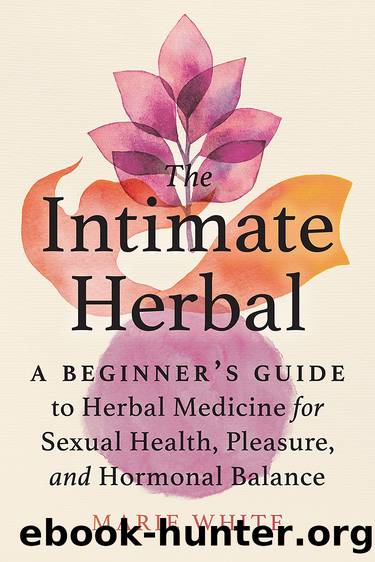The Intimate Herbal by Marie White

Author:Marie White [White, Marie]
Language: eng
Format: epub
ISBN: 9781623176648
Publisher: North Atlantic Books
Lubricants: Which One Should You Choose?
Having sex while lacking proper lubrication not only makes intercourse uncomfortable; it can result in injury. When the vagina isnât properly lubricated and wet during sex, pain and abrasions can result and lead to irritation and inflammation, chronic yeast and bacterial infections, and increased likelihood of sexually transmitted infections. Donât be shy to use lube liberally during sexual playâitâs wise, healthy, and sexy. But conventional lubricants carry their own set of risks and are best avoided. Not only do they contain toxic ingredients, they also cause inflammation in the vagina and anus. They can disrupt cellular turnover, elasticity, and pH balance.
Lubes typically come in three categories: oil-based (which is incompatible with condoms), water-based, and silicone-based. The use of water-based over-the-counter personal lubricants can dry out and irritate vaginal and rectal tissue, resulting in dryness, burning, irritation, microbial imbalance, and infection.74 A 2008 study on the popular commercial lubricants Femglide, K-Y Jelly, and Astroglide demonstrated tissue damage in the vagina that ranged from moderate to severe as a direct result of their use.75 Intimate wellness is built upon a complex and delicate interplay between the biochemistry and microbiome of the vagina, and this fine-tuned dance is worth protecting. Products formulated with little care and chock-full of disruptive ingredients are best avoided in your bedroom.
Common ingredients in conventional oil-based lubes run the gamut from petroleum and petroleum-derived oils, which coat the vaginal tissues and are associated with an increased risk of bacterial vaginosis (BV). Petroleum-based products may be contaminated with polycyclic aromatic hydrocarbons (PAHs), which are a byproduct of the manufacturing process and to which cancer, persistence, bioaccumulation, and endocrine disruption are all strongly associated.
Silicone-based lubes, on the other hand, coat the vaginal walls and the vulva, making it slippery and silkyâbut with a price. Silicone may interfere with healthy vaginal function by disrupting pH, microbiome balance, and tissue health.
Other problematic ingredients in lube include propylene glycol, parabens, synthetic fragrances, and spermicides like nonoxynol-9. Herbalist and author of Hot Pants: Do-It-Yourself Gynecology and Herbal Remedies Isabelle Gauthier shares a cautionary tale about this particular spermicide: âThe problem is that itâs a little too strong. I once watched an Australian sex worker use a single condom lubricated with nonoxynol-9 to remove nail polish off both her hands.â76 Use with caution!
Three ingredients stand out as safe and pleasurable options for luscious lubing: pure aloe vera gel, vegetable glycerin, and coconut oil. Aloe vera gel and vegetable glycerin are condom-safe, while coconut oil is not. Aloe vera and vegetable glycerin are compatible with one another, which means you can easily blend the two at a half-and-half ratio, or another ratio of your choosing. Coconut oil can be used in its natural form (hard at cooler temperature, and liquid at warmer temperature). In cold northern climates, you may opt for fractionated coconut oil, which stays liquid and is easier to play with during sex.
Download
This site does not store any files on its server. We only index and link to content provided by other sites. Please contact the content providers to delete copyright contents if any and email us, we'll remove relevant links or contents immediately.
| General | Men's Sexual Health |
| Women's Sexual Health |
Come as You Are by Emily Nagoski(4001)
The Evolution of Beauty by Richard O. Prum(2569)
The Happy Hooker by Xaviera Hollander(2293)
The Clitoral Truth: The Secret World at Your Fingertips by Rebecca Chalker(2271)
The Psychology of Human Sexuality by Lehmiller Justin J(2213)
The Book of Questions: Revised and Updated by Gregory Stock Ph.d(2162)
Women on Top by Nancy Friday(2154)
The Modern Alpha Male: Authentic Principles to Become the Man You Were Born to Be: Attract Women, Win Friends, Increase Confidence, Gain Charisma, Master Leadership, and Dominate Life - Dating Advice by Patrick King(1852)
The Coregasm Workout by Debby Herbenick(1844)
The Ultimate Guide to Anal Sex for Women by Tristan Taormino(1773)
She-ology by Sherry A. Ross MD(1714)
101 Nights of Great Sex by Laura Corn(1711)
The Hite Report on Shere Hite by Shere Hite(1681)
Orgasm mini book by Susan Bakos(1553)
The Ultimate Guide to Fellatio by Violet Blue(1539)
A Round-Heeled Woman by Jane Juska(1538)
The Alchemy of Sexual Energy by Mantak Chia(1506)
The Penis Book by Aaron Spitz(1460)
The Sexual Ecstasy Workbook by Margot Anand(1302)
